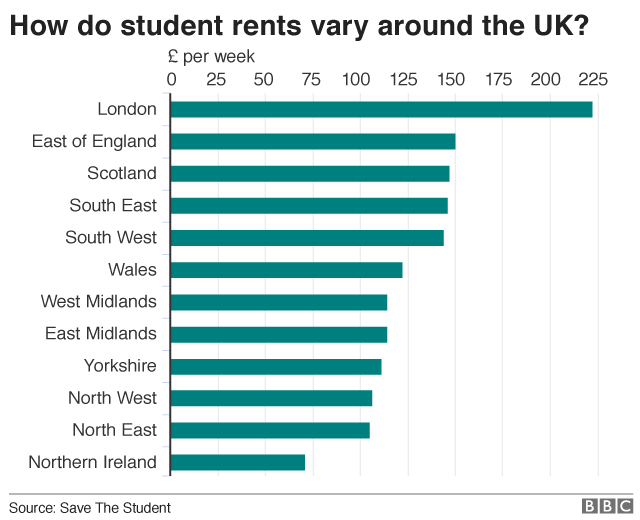Rent burden 'leads to student stress'
- Published

Students are suffering from stress and anxiety caused by the pressures of housing costs, a survey has suggested.
Average rent for student accommodation totals £131 a week, eating up nearly all of a typical maintenance loan or grant, even before a typical £509 in upfront letting fees and deposit are taken into account.
The maintenance loan is designed to cover living costs, is separate from the student loan to pay for tuition fees, and is dependent on family household income.
The survey, by student finance website Save The Student, claims that the average award leaves a typical UK student with only £8 a week for all other living costs such as food, travel and toiletries, after the rent has been paid.

Jake Butler says the cost of living should be part the student finance debate
"The fact that the maintenance loan barely covers students' rent is shocking. Students are forced to get a job at the expense of their studies or rely on their parents who may struggle to support them," says Jake Butler, operations director at the website.
"Forget about tuition fees and high interest rates. Now that the government are finally reviewing the student finance system, a fairer maintenance loan should be at the top of their agenda."
So how do students cope financially? Here, three explain how they have tried to keep the costs down.
Living at home
Fiona Scott is studying social science in Edinburgh and decided to move back home owing, in part, to the financial difficulties she faced.
It means the 20-year-old now faces a commute, by bus, of up to two hours to get to lectures and classes five days a week.

Fiona says some students find it tough dealing with money
"I wanted to stay part of the student experience but there are a lot of hidden costs," she says.
"I have seen people crash and burn financially in their first month. Others have had problems having to wait for a grant to come through on time. It put them in a hard position.
"I moved because I was exhausted. It means I have saved money overall."

Where to go for help
Student finance: What you need to know, external, from the independent Money Advice Service
Save The Student, external website
Maintenance loans and grants information in England, external, Wales, external, Scotland, external, and Northern Ireland, external
Money and funding, external, from the National Union of Students

Some 44% of students struggle to keep up with rent, according to the Save The Student survey. Nearly half (45%) of respondents said their mental health suffered as a result. Almost a third (31%), like Fiona, said their study risked being affected.
Yet, relatively few - just 8% of those surveyed - choose to live with their parents instead. On average, these stay-at-home students pay £167 a month to their parents, some £400 less a month than those paying rent to a landlord.
Students, on average, live just 20 minutes from their campus. Those living at home often have to travel further.
Staying on in halls of residence
Rosalynn Funnell says that staying on in a university hall of residence for a second year is "abnormal".
"I may be missing out on the social side [of a shared house] but it is a decision I had to make," the 20-year old says.
Some 29% of students asked in the survey lived in university halls.

Rosalynn has decided to stay in halls of residence
Rosalynn, who is studying for a Masters in town planning at Oxford Brookes University, says that her maintenance loan failed to cover her living costs.
Her father has withdrawn cash from his pension to support her - a sacrifice which she is "very conscious of" when organising her finances.
"I am living in accommodation that costs me £7,000 a year, but I know people living 10 to a house in the city centre who are paying more than that," she says.
She is far from alone in turning to parents for financial, practical and moral support.
The survey suggests that 43% of respondents turned to parents, 32% used university services, and 30% went to friends.
Looking for cheap rent
Shane Dooner was living in university accommodation in Plymouth, but found a cheaper alternative in a privately rented shared house.
The 21-year-old, studying primary education, was replacing another tenant who needed to move out and so got a cheaper deal.
He did not feel he was getting value for money from his previous accommodation - a view shared by one in three of those asked in the survey. He felt in effect he was confined to a single room while still paying a significant amount of rent.

Sharing a house can bring its own challenges. The biggest concern by far for student renters, according to this survey, is noisy housemates.
Shane is from a low-income background and so receives a maintenance loan, but he supplements this by working as a team leader at Tesco.
"There are quite a few people whose parents have to pay, but many are not in a position to do that," he says.
Geography has a big effect on this burden. The Save The Student research suggests students in London face the highest rents (£222 a week on average),
The East of England comes next (£150 a week), followed by Scotland (£147 a week), the South East of England (£146 a week) and the South West (£144 a week) - all without the location-weighted loan allowance that students in London can get.
Northern Ireland was the cheapest, with typical rent of £71 a week.
Whatever the costs and support, the independent, government-backed Money Advice Service suggests that financial planning is key.
"If you receive your maintenance loans or other awards or means-tested funding at the beginning of each term, it can seem like a lot of money, but making it last for both the academic year and holidays can be quite a stretch," it says.
"It is a good idea to work out a budget based on the money you have coming in and out, regularly."
Where can you afford to live? Try our housing calculator to see where you could rent or buy
This interactive content requires an internet connection and a modern browser.
- Published9 July 2020

- Published22 February 2018

- Published19 February 2018

- Published19 February 2018
